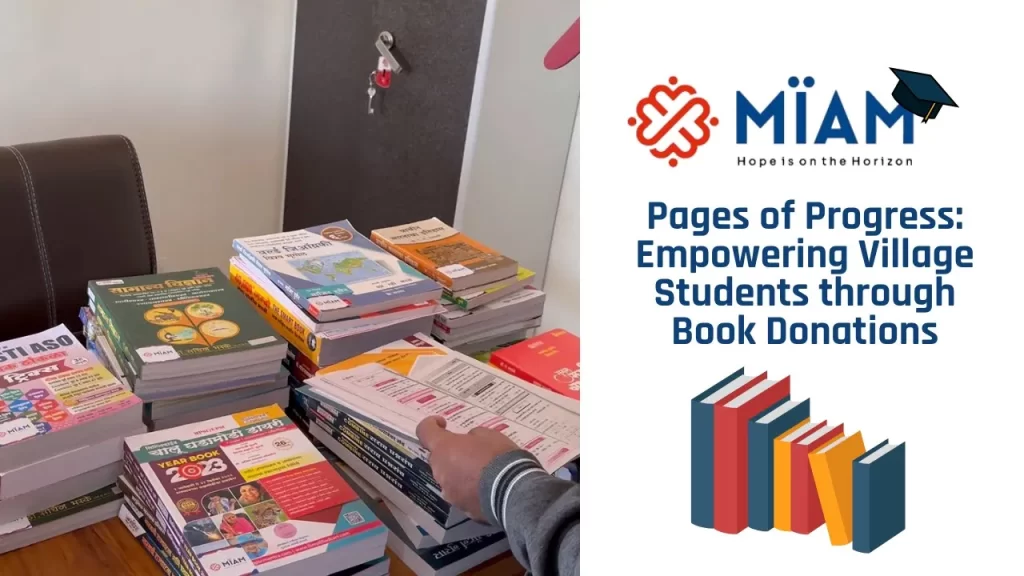- nitu@miamcharitabletrust.com
- Mumbai, India
- nitu@miamcharitabletrust.com
- Mumbai, India

Pages of Progress: Empowering Village Students through Book Donations
Introduction
In the heart of Nasik district, small villages like Wadgaon Pingla, Lakhalgaon, and Chincholi are witnessing a remarkable transformation in their educational landscape. Thanks to the collaborative efforts of the local Gram Panchayats and the visionary leadership of Nitu Joshi, the head of MIAM Charitable Trust, these villages are experiencing a surge in educational resources through book donations. This initiative aims to uplift the educational standards and opportunities for the students residing in these villages.

The Significance of Book Donations
Bridge to Knowledge:
Access to books is fundamental to fostering a culture of learning and curiosity among students. By donating books to village libraries, we provide a bridge to knowledge, opening doors to new ideas and perspectives.
Empowerment Through Education:
Education is the key to empowerment, especially in rural areas where access to resources may be limited. Through book donations, we empower students to dream, learn, and aspire for a brighter future.
The Role of Gram Panchayats
Community Engagement:
Gram Panchayats play a pivotal role in facilitating community development initiatives. By actively supporting book donation drives, they demonstrate their commitment to the holistic development of the villages they serve.
Infrastructure Support:
Ensuring the proper infrastructure for libraries is crucial for the success of book donation programs. Gram Panchayats provide essential support in maintaining and upgrading library facilities to create conducive learning environments.
Nitu Joshi: A Beacon of Hope
Visionary Leadership:
Nitu Joshi, as the head of MIAM Charitable Trust, embodies visionary leadership and a passion for education. Her dedication to improving educational outcomes in rural areas has been instrumental in driving the book donation initiative forward.
Community Engagement:
Nitu Joshi actively engages with local communities to understand their unique needs and challenges. Through collaborative efforts, she ensures that book donation programs are tailored to address the specific requirements of each village.

Impact on Students
Igniting Curiosity:
For students in villages like Wadgaon Pingla, Lakhalgaon, and Chincholi, access to a diverse range of books ignites curiosity and nurtures a love for learning. Through exploration and discovery, students expand their horizons and develop critical thinking skills.
Academic Excellence:
Equipped with a wealth of educational resources, students are better positioned to excel academically. By supplementing classroom learning with self-directed study, they enhance their academic performance and unlock their full potential.
Conclusion
The initiative to donate books to village libraries in Nasik district represents a beacon of hope for the future generation. Through the collective efforts of Gram Panchayats, Nitu Joshi, and organizations like MIAM Charitable Trust, we are not just donating books; we are nurturing minds, empowering communities, and building a brighter future for all.
FAQs
- How can I contribute to book donation efforts in rural areas?
- You can reach out to local organizations or charities involved in educational initiatives and inquire about their book donation programs. Additionally, you can organize book drives within your community to collect books for donation.
- What types of books are most needed for donation?
- While all books are valuable, there is often a high demand for educational resources such as textbooks, storybooks, reference materials, and books on diverse subjects to cater to the varied interests and academic needs of students.
- How do book donations impact the overall development of rural communities?
- Book donations not only enhance educational opportunities for students but also contribute to the overall socio-economic development of rural communities by fostering a culture of literacy, critical thinking, and lifelong learning.
- Are there any specific challenges associated with implementing book donation programs in rural areas?
- Yes, some challenges include inadequate infrastructure for library facilities, logistical constraints in transporting and distributing books, and ensuring sustained community engagement and participation in the initiative.
- How can we measure the success of book donation programs in rural areas?
- Success can be measured through various indicators such as increased library usage, improved academic performance among students, enhanced community engagement in educational activities, and the overall positive impact on the quality of education in the target areas.
